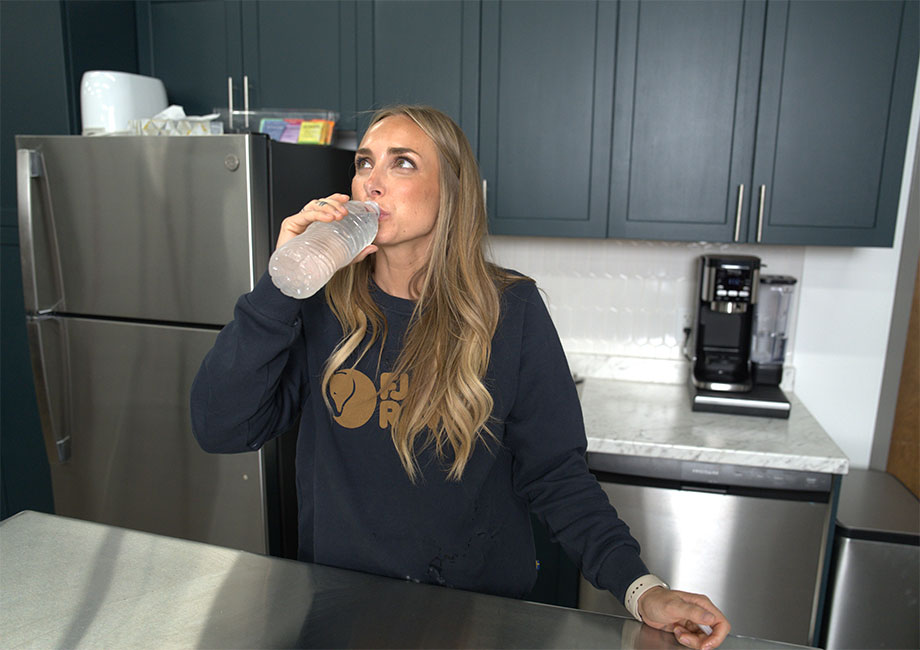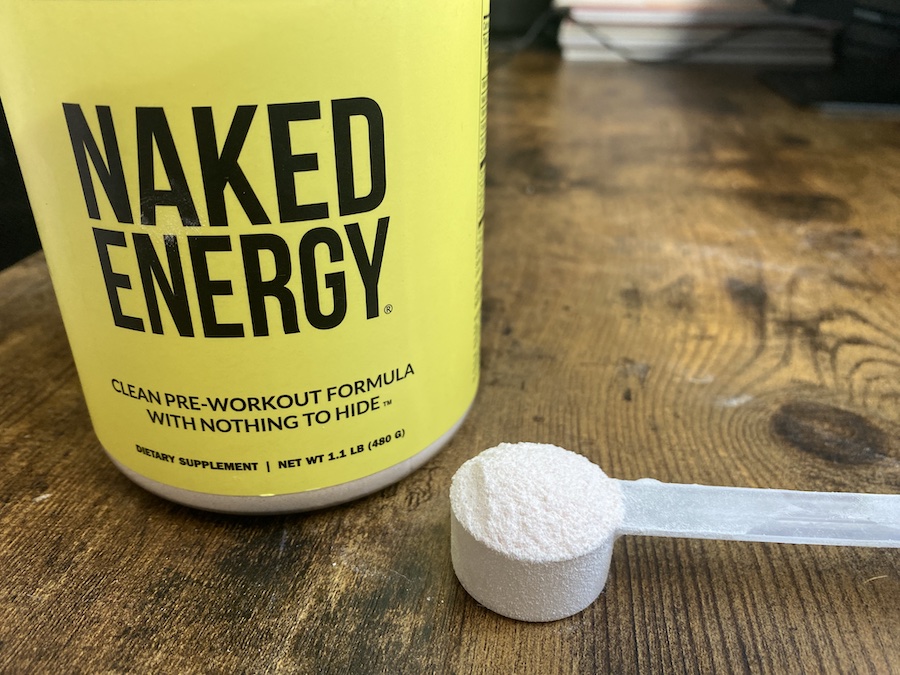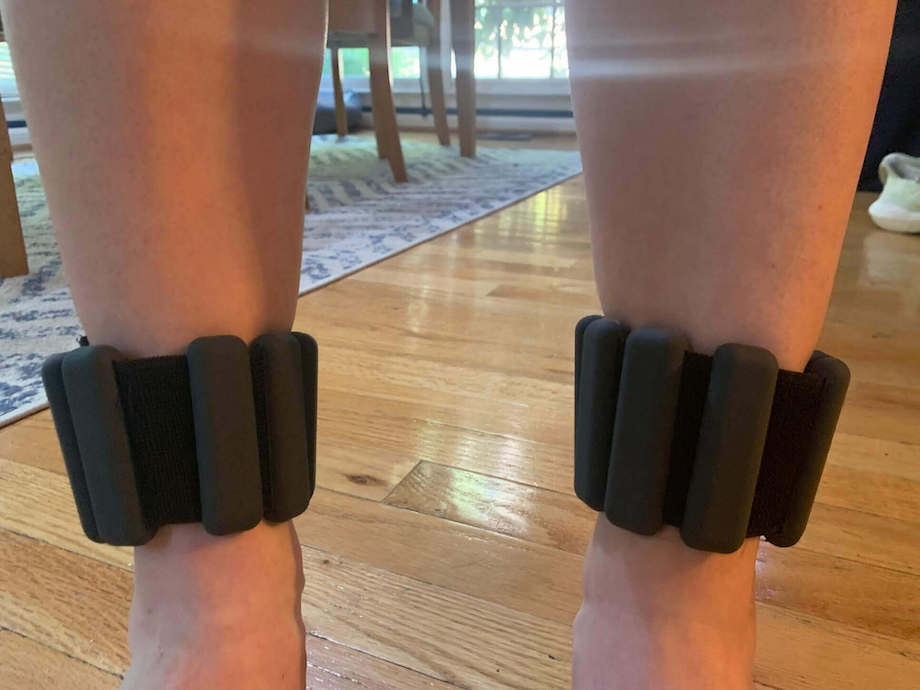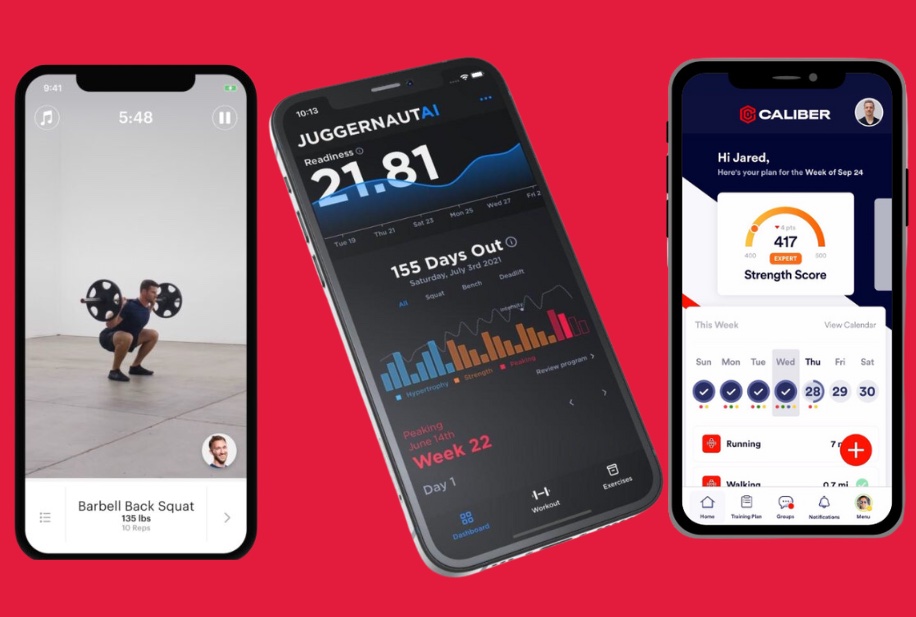From fasted cardio to intermittent fasting, the practice of abstaining from food is far from new. The history of fasting1 runs deep, often intertwined with spiritual traditions like Ramadan and Lent. But beyond its religious roots, fasting is also associated with various health benefits, including weight management and disease prevention.
Recently, a particular type of fasting has been making a splash: water fasting. If you can believe it (*wink*), water fasting is riding a wave of popularity fueled by viral social media trends and the allure of weight loss.
If you’re curious about water fasting, you’re in the right place. As a registered dietitian nutritionist (RDN), I’ll guide you through its potential benefits, risks, safety, and more. So, water you waiting for? Let’s dive in!
What Is Water Fasting?
Water fasting is the practice of consuming only water, completely abstaining from food and other beverages. The optimal duration remains under-researched, but a common intermittent fasting2 approach is to have a day once weekly where you only drink water and maintain regular eating habits on the other six days.
Prolonged water-only fasting3 warrants medical supervision to prevent the complications of refeeding syndrome4, a life-threatening condition that can occur when nutrition is rapidly reintroduced after a period of starvation. However, with proper supervision, this type of fasting may offer deeper therapeutic benefits.
Benefits of Water Fasting
The potential benefits of water fasting range from weight loss to disease prevention to longevity. Let’s take a look at these in greater detail.
May Promote Autophagy
Think of autophagy5 as your body’s natural housekeeping crew, recycling old or damaged cell parts to keep everything running smoothly. When this process falters, it can accelerate aging and increase the risk of chronic diseases.
This cellular maintenance system responds to many factors, including oxidative stress6 and nutrient deprivation. Although most of the current evidence comes from animal studies, some research suggests that fasting-induced autophagy could help defend against certain cancers and neurodegenerative diseases and potentially extend lifespan5.
May Aid Weight Loss
Weight loss is a significant draw for those considering water fasting, and while research supports this approach, it comes with important caveats. A 2024 review7 highlights that prolonged fasting, lasting from five to 20 days, can lead to a mild to moderate weight loss of 2% to 10%, although two-thirds of this weight loss comes from lean mass, with only one-third from body fat.
The pace of weight loss also varies. Water-only fasters may lose nearly two pounds (0.9 kilograms) daily in the first week. However, this initial drop is primarily due to fluid loss rather than fat loss3.

Here’s a quick dive into the science of fluid loss during a water-only fast: When you fast and cut calorie intake, particularly from carbohydrates, your body starts to deplete its glycogen stores from the liver and muscles. A 2018 review8 highlights that glycogen is stored with at least 3 grams of water, so its depletion releases the water, resulting in weight loss.
As the fasting continues, the weight loss pace slows, averaging about 0.66 pounds (0.3 kilograms) per day by the third week. At this stage, the weight loss is a mix of fat and lean mass.
May Prevent Cardiometabolic Diseases
Cardiometabolic diseases like hyperlipidemia (high blood lipids) and hypertension (high blood pressure) are major global health challenges, often driven by insulin resistance9, a condition in which the body struggles to maintain healthy blood sugar levels due to poor insulin sensitivity.
Insulin resistance is a primary cause of obesity, yet this condition makes it hard to maintain a healthy weight. Since water fasting promotes weight loss, it may also prevent and manage these health conditions.
A 2022 study3 shows that a 10-day water-only fast, followed by a five-day whole-plant-food diet, can reduce body weight, body mass index, abdominal circumference, and blood pressure. Additionally, a 2024 review7 suggests that fasting for up to 20 days can promote weight loss, lower blood pressure, and improve other metabolic metrics.
However, these benefits aren’t observed in individuals with Type 1 and Type 2 diabetes and are short-lived, disappearing within four months even if weight loss is maintained7.
Risks of Water Fasting
Because fasting duration and experiences can vary wildly, it’s challenging to fully document all adverse effects. However, there are known risks, safety concerns10, and side effects of fasting to be aware of.
Initial Side Effects
About 12 hours after your last meal, your body enters a metabolic shift: glycogen stores in the liver deplete, and your body starts to convert fatty acids into ketones for energy. This transition can bring on short-term symptoms similar to those in the early stages of the ketogenic diet, such as nausea, headaches, fatigue, and dizziness2.
Dehydration
Call up Alanis because it’s ironic: consuming only water may lead to dehydration10. While most of our daily hydration does come from water, we also obtain hydration from sources that are off-limits during a water-only fast—like milk, juice, and water-rich fruits and vegetables.
Electrolyte Imbalances
Electrolytes11—such as sodium, potassium, calcium, and magnesium—are crucial for fluid balance, muscle contraction, nerve function, and blood pressure regulation. While diet and the best electrolyte drinks can provide sufficient electrolytes, a water-only fast can dangerously disrupt this balance.

Research indicates that maintaining proper water-mineral balance becomes nearly impossible after eight days of water fasting. Hyponatremia (low sodium) is particularly concerning, as it’s a severe condition that can even be fatal, and it has been observed within this time frame10.
Muscle Loss
Engaging in a water fast can lead to significant weight loss, but the type of weight you are shedding isn’t always ideal. At first, you’ll primarily lose water weight—an expected outcome with many restrictive diets.
As the fast continues, a genuine concern arises—you can lose precious muscle mass. This isn’t just about appearance; skeletal muscle strength is crucial for bone health, balance, flexibility, posture, and overall health and wellness, especially as we age.
How To Water Fast
Before learning how to fast12, it’s crucial to recognize that this practice isn’t suitable for everyone.
Certain groups and people with medical conditions should avoid water fasting unless under strict medical supervision. These include but are not limited to, individuals with diabetes or gout, those with a current or past eating disorder, those who are pregnant, those under the age of 18, and older adults.
Even if you don’t fall into these categories, consulting a healthcare professional before attempting water fasting is a wise precaution, especially if a prolonged fast interests you.
Although there are no universally accepted, evidence-based guidelines for water fasting, some general principles help guide this approach.
During the Water Fast
You will only consume water during a water fast, avoiding all other foods and drinks.
While there isn’t a hard-and-fast rule for how much water to drink, one study10 suggests aiming for two to three liters daily, preferably from mineralized water to maintain essential minerals and electrolytes like sodium and potassium10. There’s also no set duration for a water fast, but a common approach is to fast for 24 hours, or up to 72 hours2.
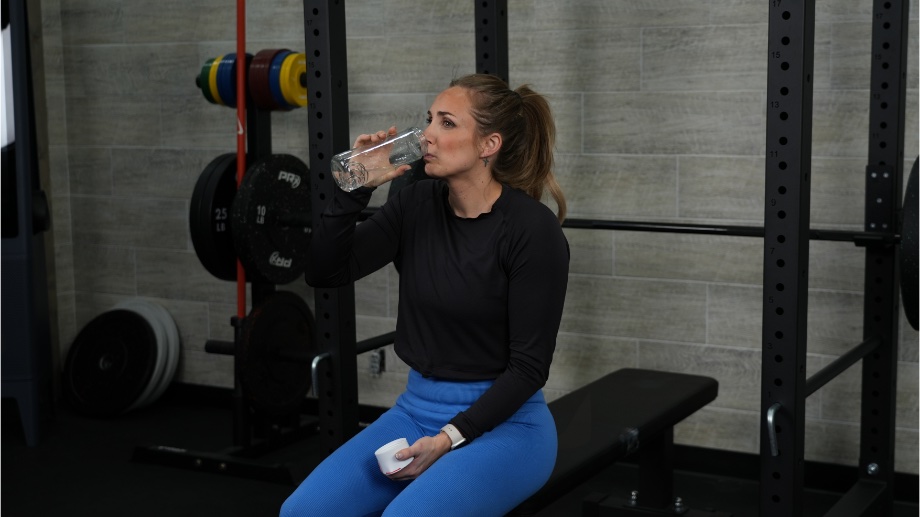
About 12 hours after your last meal, your body starts switching from glucose to ketones for energy, and you may experience symptoms like nausea, headaches, fatigue, and dizziness2. Because of this, avoiding strenuous exercise and operating heavy machinery while fasting is wise, especially if you are new to the effects of water fasting.
Post-Fast Period
After a fast, diving into a big meal is tempting, but starting with a small, light option—like a smoothie or fruits and veggies3—can help avoid the digestive discomfort that some people encounter. As the day progresses and you feel ready, gradually reintroduce larger portions.
One study recommends transitioning from fasting periods to feasting mode with a nutrient-rich, balanced diet, such as the Mediterranean diet. Prioritizing adequate protein intake is also crucial for preserving lean muscle mass12.
The post-fast period becomes increasingly critical as the length of your fast increases. For fasts lasting more than three days, medical supervision is essential. However, you should be able to return to your usual routine with relative ease after shorter fasts.
Water Fasting: Final Thoughts
Water fasting, which involves consuming only water, has gained attention for its potential health benefits. However, formal guidelines are scarce, and long-term advantages still need to be determined. Here are some key considerations:
- Short-term water fasts, typically lasting up to three days, are generally safe for healthy individuals. However, for extended fasting or if you have underlying health conditions, a medically supervised water fast is essential to mitigate serious risks, such as electrolyte imbalances and refeeding syndrome.
- Water fasting may lead to several potential benefits, including aiding weight loss, improving cardiovascular risk factors, reducing oxidative stress, and promoting longevity. However, it’s important to note that initial weight loss is often due to water loss, and as the fast progresses, the risk of losing valuable muscle mass increases.
If you’re still interested in water fasting, I encourage you to define your goal before diving into it. Do you have your goal in mind? I highly recommend you consult a healthcare professional for guidance to help you safely navigate these waters.
Water Fasting: FAQs
Do you lose weight on a water fast?
You can lose weight on a water fast, but it’s not all fat loss. Initially, you may lose around two pounds daily, mainly due to fluid loss. As the fast progresses, the rate slows to about 0.66 pounds per day by the third week, with the weight loss being a mix of body fat and lean mass3. A 2024 review7 indicates that up to 10% of body weight can be lost in 20 days, but two-thirds of that loss is likely lean mass.
What are the rules for water fasting?
The main rule of water fasting is to consume only water, avoiding all other foods and beverages. While there are no strict guidelines on the exact amount of water to drink, general recommendations encourage aiming for two to three liters daily, preferably from mineralized sources to maintain essential electrolytes like sodium and potassium10. The duration of a water fast also varies, but a common practice includes an intermittent fast for 24 hours2, and you should seek medical supervision for fasts lasting longer than 72 hours.
Is 3 day water fasting good?
Whether a three-day water fast is “good” depends on individual health circumstances and goals. Some people may experience benefits such as short-term weight loss (primarily due to fluid loss), while others may suffer from headaches, dizziness, dehydration, and other adverse effects.
References
- Kerndt, P. R., Naughton, J. L., Driscoll, C. E., & Loxterkamp, D. A. (1982). Fasting: the history, pathophysiology and complications. The Western Journal of Medicine, 137(5), 379–399.
- Vasim, I., Majeed, C. N., & DeBoer, M. D. (2022). Intermittent Fasting and Metabolic Health. Nutrients, 14(3), 631. https://doi.org/10.3390/nu14030631
- Scharf E, Zeiler E, Ncube M, Kolbe P, Hwang SY, Goldhamer A, Myers TR. The Effects of Prolonged Water-Only Fasting and Refeeding on Markers of Cardiometabolic Risk. Nutrients. 2022 Mar 11;14(6):1183. doi: 10.3390/nu14061183. PMID: 35334843; PMCID: PMC8951503.
- Persaud-Sharma, D., Saha, S., & Trippensee, A. W. (2022). Refeeding Syndrome. In StatPearls. StatPearls Publishing. https://pubmed.ncbi.nlm.nih.gov/33232094/
- Shabkhizan, R., Haiaty, S., Moslehian, M. S., Bazmani, A., Sadeghsoltani, F., Saghaei Bagheri, H., Rahbarghazi, R., & Sakhinia, E. (2023). The Beneficial and Adverse Effects of Autophagic Response to Caloric Restriction and Fasting. Advances in Nutrition (Bethesda, Md.), 14(5), 1211–1225. https://doi.org/10.1016/j.advnut.2023.07.006
- Yun, H. R., Jo, Y. H., Kim, J., Shin, Y., Kim, S. S., & Choi, T. G. (2020). Roles of Autophagy in Oxidative Stress. International Journal of Molecular Sciences, 21(9), 3289. https://doi.org/10.3390/ijms21093289
- Ezpeleta, M., Cienfuegos, S., Lin, S., Pavlou, V., Gabel, K., & Varady, K. A. (2024). Efficacy and safety of prolonged water fasting: a narrative review of human trials. Nutrition Reviews, 82(5), 664–675. https://doi.org/10.1093/nutrit/nuad081
- Murray, B., & Rosenbloom, C. (2018). Fundamentals of glycogen metabolism for coaches and athletes. Nutrition Reviews, 76(4), 243–259. https://doi.org/10.1093/nutrit/nuy001
- Freeman, A. M., Acevedo, L. A., & Pennings, N. (2023). Insulin Resistance. In StatPearls. StatPearls Publishing. https://pubmed.ncbi.nlm.nih.gov/29939616/
- Ogłodek, E., & Pilis Prof, W. (2021). Is Water-Only Fasting Safe?. Global Advances in Health and Medicine, 10, https://doi.org/10.1177/21649561211031178
- Shrimanker, I., Bhattarai, S. Electrolytes. [Updated 2023 Jul 24]. In: StatPearls [Internet]. Treasure Island (FL): StatPearls Publishing; 2024 Jan-. Available from: https://www.ncbi.nlm.nih.gov/books/NBK541123/
- Attinà, A., Leggeri, C., Paroni, R., Pivari, F., Dei Cas, M., Mingione, A., Dri, M., Marchetti, M., & Di Renzo, L. (2021). Fasting: How to Guide. Nutrients, 13(5), 1570. https://doi.org/10.3390/nu13051570



